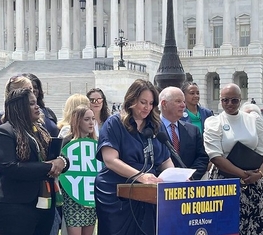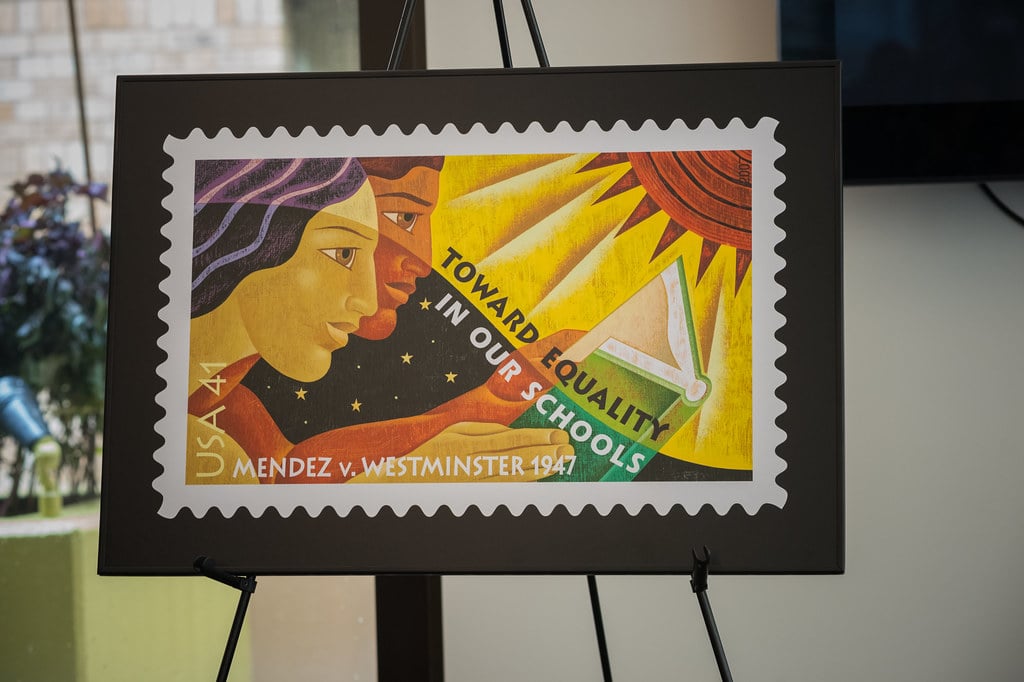My Hispanic and Latina Heroes
Hispanic Heritage Month (Sept. 15 – Oct. 15) is a time to recognize and celebrate the achievements and contributions of Hispanic and Latina Americans. This month, I want to highlight four trailblazers who’ve fought for the rights of women and paved the way for the next generation of civil rights activists.
Dolores Huerta
Labor Leader, Civil Rights Activist
Dolores Huerta was born on April 10, 1930, in Dawson, New Mexico. Huerta’s father was a farmworker and miner who became a state legislator in 1938; her mother was a community activist who ran a local hotel. Their civic engagement sparked Huerta’s later work as one of the most influential labor activists and leaders of the Chicano civil rights movement.
Huerta attended the University of the Pacific’s Delta College, where she trained as a teacher. She briefly taught in the 1950s, but after seeing so many of her students show up to class hungry and barefoot, she began her lifelong journey as an organizer and activist.
In the 1960s, she founded the Agricultural Workers Association and led voter registration drives, specifically helping Hispanic Americans register to vote. She later met César Chávez, and the two co-founded the National Farm Workers Association, an organization meant to empower agricultural workers and improve working conditions.
Huerta quickly realized that she wasn’t only advocating for farm workers’ rights but also challenging gender discrimination. She emphasized the importance of the entire family in advocacy, since it was not just men but women and children who were involved in and impacted by agricultural work. Later in her career, she focused on women’s rights, specifically on encouraging more Hispanic women to run for office at the local, state, and federal levels.
In 2012, Huerta received The Presidential Medal of Freedom. Now at the age of 91, Dolores continues her activism through her organization, the Dolores Huerta Foundation, an organization that advocates for women, children, and farm workers.
Sonia Sotomayor
Justice Sotomayor was born and raised in Bronx, New York by her single mother after the passing of her father. During childhood, her mother placed a heavy emphasis on the importance of education, and Sotomayor ultimately enrolled in Princeton University.
During her time at Princeton, Sotomayor felt overwhelmed by her new surroundings and initially did poorly. This changed when she became involved with different Puerto Rican groups on campus, which served as an “anchor” in a new world. During this period, Princeton did not have Hispanic professors nor classes on Latin American studies. Sotomayor took a great interest in ensuring Hispanic representation within the school, and joined both students and the Department of Health, Education, and Welfare in filing a complaint against Princeton for “an institutional pattern of discrimination.”
In 1976, she graduated summa cum laude from Princeton and was awarded the Pyne Prize, the highest academic award an undergraduate can receive. She is believed to be the first Latina student to have won this distinction.
She attended Yale Law School and passed the bar in 1980. Sotomayor began her career as an assistant district attorney in New York, and just a few years later made partner at the commercial litigation firm, Pavia & Harcourt. Sotomayor also served on the board of the Puerto Rican Legal Defense and Education Fund, the New York City Campaign Finance Board, and the State of New York Mortage Agency.
She began her lifelong journey as a judge in the early 1990s when President H.W. Bush nominated her to the US District Court of the Southern District of New York. In 1997, she was nominated by President Bill Clinton to the US Court of Appeals for the Second Circuit. In 2009, President Barack Obama nominated her to the US Supreme Court -- where she is currently serving. She is the first Latina and fourth women to serve on the highest court in the US.
Jovita Idár
Journalist, Suffragist
Jovita Idár was born in 1885 in Laredo, Texas. She was a natural-born social justice activist, influenced by her newspaper editor and a civil rights advocate father.
Throughout Idar’s lifetime, Mexican Americans frequently faced violence, discrimination, and lynching across Texas. Her family frequently spoke out about this mistreatment.
Idár earned her teaching certificate in 1903 but immediately resigned due to the segregation and discrimination against Mexican American students. She joined her brothers at their father’s newspaper, La Crónica, a news source for Mexican American rights. In 1911, they organized the First Mexican Congress to unify Mexican Americans and advocate for education and economic resources.
Soon after, Idár became passionate about women’s suffrage and began advocating for women’s right to vote. In 1911, she founded the La Liga Feminil Mexicaista (The League of Mexican Women); in a nod to her brief stint as a teacher, La Liga began by providing education for Mexican American students.
A few years later, Idár went to Mexico as a nurse to help wounded soldiers during the Mexican Revolution. When she returned, she went back to writing articles about the injustice and racial discrimination her community continued to face.
Idár dedicated her life’s work to provide educational resources to her community and advocating for Mexican American rights. She passed away in 1946 at the age of 61.
Sylvia Mendez
Activist
Mendez was at the center of the landmark 1947 case, Mendez v. Westminster, in which her parents and neighbors fought against school segregation in California.
Sylvia Mendez was born in Santa Ana, California in 1936. When she was eight years old, her parents attempted to enroll her in an all-white elementary school, but she was turned away due to her skin color. Her only remaining option was to attend the local school for Mexican children, which consisted of two wooden shacks, and focused on labor and household work rather than reading and writing.
Mendez’s parents were furious, knowing that their children deserved the same resources and education as others. Felicitas, Sylvia’s mother, organized other parents and hired lawyers to start building their case, Mendez v. Westminster. Less than a year later, the courts ruled in favor of the Mendez family, which influenced then-California Governor Earl Warren to outlaw school segregation in California.
While Mendez was able to attend the formerly segregated school, during her time as a student she endured racist bullying from her peers. She persisted in her education in spite of this, eventually becoming a nurse.
After retiring from nursing, Mendez devoted her life to traveling the country and sharing how her family paved the way for desegregation. In 2011, President Barrack Obama awarded her with the Presidential Medal of Freedom.
Hispanic Heritage Month is our chance to honor and celebrate the amazing accomplishments of individuals that identify as Hispanic or Latina! Who are your inspirations? Share with us on Twitter by using the hashtag #MyLatinaHero.
The Latest from the League
The League of Women Voters CEO Virginia Kase was among the four Hispanic women honored with a Leadership award from the Hispanic Heritage Foundation this month. The event was broadcast on PBS Friday, October 11.
The League of Women Voters Education Fund launched the award-winning election website VOTE411.org in Spanish.
The world of democracy and voting rights is no different. Last week, we highlighted just a few of the change-makers that allow organizations like the League to exist today. Now, we'd like to highlight a few that we know very well: members of Team LWV.
Sign Up For Email
Keep up with the League. Receive emails to your inbox!
Donate to support our work
to empower voters and defend democracy.






_4.png?itok=KbpXseyz)
.jpg)
